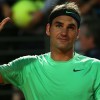Should Roger Federer and his fans worry about his new short haircut?
The 17-time major singles champion arrived in Rome for the Italian Championships sporting perhaps the shortest haircut he has had in his playing career. Playing with short hair hasn’t always brought out the best for the Swiss maestro, as Rene Stauffer wrote in his book ROGER FEDERER: QUEST FOR PERFECTION ($19.95, New Chapter Press, www.RogerFedererBook.com) In the book, Stauffer compares Federer’s short locks from the summer of 2004 to that of the biblical figure Samson. Part of the book chapter “Samson’s Return” is excerpted below.
On August 1, Switzerland’s national holiday and on the second anniversary of the death of Peter Carter, Federer defeated Roddick 7-5, 6-3 in the final of Toronto. He dedicated what was already his eighth tournament victory of the year to Carter—and to “him alone.” Federer’s win also established a new superlative in tennis—he was the first player since Björn Borg in 1979 to win three consecutive tournaments on three different surfaces—grass (Wimbledon), clay (Gstaad) and on hard courts (Toronto). “I hope to be able to have coffee with Borg sometime and have a talk about these series,” Federer said. He proudly pointed out that there were players who reached the No. 1 ranking but lacked titles on certain surfaces, including Boris Becker, who failed to win a title on clay during his career.
Winning the championship was not the only momentous experience for Federer in Toronto—he had his hair cut short. In April, Federer’s flowing mane was reduced by several centimeters, visually giving him a strong resemblance to Peter Lundgren. His hair, now, was considerably shorter, with a layered look. He actually just wanted a trim, Mirka explained, but the hair dresser convinced him to try something new for a change.
Federer’s new look, however, didn’t sit well the “gods of tennis.” His strength seemed to emanate from his hair, like Samson in the Bible. Samson possessed super-human powers but after the Philistines trimmed his flowing locks, his powers diminished. If Federer had known what was going to happen to him during the next few tournaments, he would have been wise to skip his visit to the hair dresser in Toronto.
In Cincinnati, Federer lost in surprising fashion in the first round to Dominik Hrbaty of Slovakia, ending his 23-match winning streak. The winning streak was the longest in professional tennis in five years and the loss was Federer’s first in the opening round of a tournament since the French Open in 2003—a stretch of 15 months.
Federer, however, was quick to see the positive side of his early defeat —it gave him more time to prepare for the Olympic Games. The two-time Wimbledon champion was the star of the Swiss Olympic delegation and was considered certain to bring home a medal. He was highly motivated and he talked for months of the importance the trip to Greece was for him. Said Federer, “I’ve been looking forward to this tournament for four years.” He said he dreamed of winning the gold medal and toasting to his victory—and to his partnership with Mirka, which, like the Olympic flame, was ignited under the Olympic flag four years earlier at the Sydney Games. After his disappointing loss to Arnaud DiPasquale of France in the bronze medal match in Sydney, Federer was especially motivated to step on the medal podium. He lived modestly in the Olympic Village—in contrast to many other tennis professionals who preferred hotels. He received the honor of leading the entire Swiss Olympic delegation as the Swiss flag-bearer at the Opening Ceremonies. Yet, like most of the tennis players at the Opening Ceremonies, he stood out in the enormous mass of athletes from all around the world, who sacrificed much through the years for this one chance at glory. While many athletes soaked in the atmosphere of the Opening Ceremonies from the infield of the Olympic stadium, Federer found himself forced to entertain a constant stream of photograph and autograph requests from his fellow Olympic athletes.
The International Tennis Federation was charmed that Federer held the Olympic tournament in such high esteem. Many Olympic followers and representatives from different Olympic sports held the opinion that the highly-paid professional tennis players had no business at the Olympics (tennis had once again became an Olympic sport in 1988) and that they did not take the event as seriously as it deserved to be treated.
In an Olympic tennis competition that featured many surprises, Federer’s second-round loss to the unknown 19-year-old Czech Tomas Berdych was perhaps the most unexpected result. To make matters worse, hours after his devastating 4-6, 7-5, 7-5 loss to the No. 79-ranked Berdych, he was also eliminated from the doubles competition with partner Yves Allegro, losing to India’s Leander Paes and Mahesh Bhupathi.
Federer’s losses were major disappointments not only to himself, but to the Swiss Olympic delegation, which received another medal blow on the same day when its medal-contending judo athlete Sergei Aschwanden, also was eliminated from medal contention. Federer appeared well-composed in the media center—but he was at a loss for an explanation. He said he felt somewhat pressured and was tired after the long season, it was difficult playing against a young player like Berdych whom he didn’t know. A few months later and viewing his Olympic experience with some perspective, he quipped, “At least I carried the flag well in Athens.”

